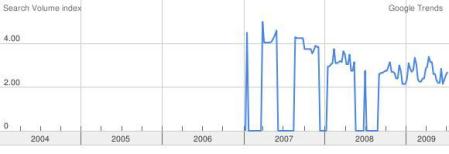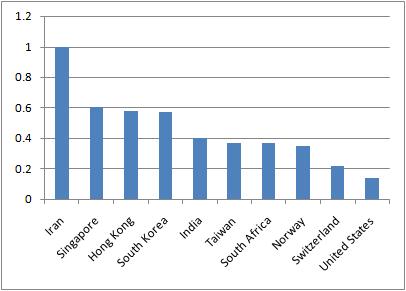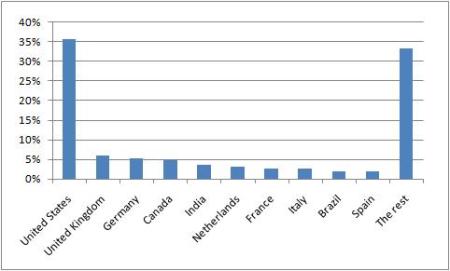*: I borrow the title from a section in the CORS/INFORMS Meeting Newsletter Vol.2, Ed.1. (It was just too good to change and parts of this post will cite the stuff from this article.)
A little while ago, Mike Trick wrote about the declining membership numbers of the INFORMS society. Right around that time I was at the CORS/INFORMS meeting and saw the google search trends on OR/MS… Seeing these back to back was a little scary at first. I cannot put the graph from the newsletter, so, I did the google trend search myself. Here are the results:

| “operations research… |
|
1.70 |
| “management science” |
|
1.00 |
Scale is based on the average worldwide traffic of “management science” in all years. That is, average number of searches on “management science” is scaled to be 1.
Since 2004, there is a decline in the search of these terms although the decline seem to have stabilized in the recent years. Overall, it looks like an “OR/MS Recession”. (This was the tittle of the CORS meeting newsletter article. By the way, I searched online for the conference newsletter which was distributed on the tables in the main room but could not find an electronic version (or, blog)!)
I cannot say I like the trend. If we want to put a positive spin on it, perhaps it is because people do know about these terms and don’t need to search as much. But… Operations research and management science is a hard field to describe. Is it math? Is it computer science? Management science seems somewhat more approachable to me. Our blogs aim to promote the word (e.g., see the subtitle of this blog). Heck, we even have an algorithm to describe it. Perhaps it is a function of the fact that we have yet to agree upon a unified term for describing the field (by ourselves and by others). Operations research, management science, analytics, numerati, … INFORMS society has a magazine called “Analytics“. This word seems to be used more often, especially in the mainstream media. I added ‘analytics’ to the trend search and take a look:

| “operations research… |
|
0.08 |
| “management science” |
|
0.04 |
Scale is based on the average worldwide traffic of “analytics” in all years.
What happened in later 2005? Number of “analytics” searches peaked. What made the word so sexy all of a sudden? Does anyone know?
In search of the answer for the spike, a simple google search on analytics brings up Google analytics (GA). GA provides website traffic information and statistics for free. The Wikipedia page on Google analytics states: “The Google-branded version was rolled-out in November 2005”. Looks like that might be the spike in the graph.
Anyway, I personally prefer ‘operations research’. The more we use it, the more it will stick.
Any thoughts on the decline the OR/MS searches? Why is it happenning? (This was a question posed in the newsletter with selected answers at a later issue but I missed it and cannot find it online!)




 Posted by guzinb
Posted by guzinb 
 The data is again scaled such that the highest number is represented as 1.0. Looking at this graph it is impossible not to wonder how come the searches on ‘stochastic programming’ from the US is much lower than from Iran?
The data is again scaled such that the highest number is represented as 1.0. Looking at this graph it is impossible not to wonder how come the searches on ‘stochastic programming’ from the US is much lower than from Iran? The fraction of visitors to
The fraction of visitors to